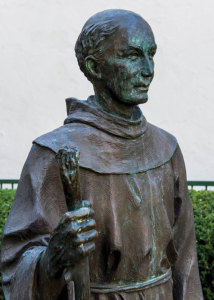
A statue of Father Serra in the courtyard of the San Buenaventura Mission in California.
The Pope will canonize a great evangelizer of the American West, But many oppose the decision. Our correspondent analyzes the controversy…
Of all the comments Pope Francis made on his recent trip to the Philippines and Sri Lanka, perhaps the least cited were those destined to have the greatest impact: the announcement that Junipero Serra, the legendary Franciscan missionary, would be made a saint.
Speaking to reporters aboard the flight to Manila, Francis revealed: “In September, God willing, I will canonize Junipero Serra in the United States, since he was the evangelizer of the western United States.”
Francis described Serra as a model evangelizer — the type he envisioned in Evangelii Gaudium, his apostolic exhortation for the new millenium.
The papal announcement met with joy and celebration — not least within the Franciscan Order, which has worked so hard and diligently to advance the great friar’s cause. But it also provoked controversy. No sooner had Francis revealed his plans, than the media rushed in to highlight the views of Serra’s critics.
The criticisms were harsh and unrelenting — and completely unfair. Serra was accused of everything from misunderstanding and mistreating the Indians, to promoting an oppressive system which upended their culture, ruining their lives. The charges weren’t new — having been answered many times — but those reading them for the first time may have been influenced by them.
Serra’s actual life — embodying courage, heroism, sacrifice and holiness — has been obscured because of this needless controversy.
Born in 1713 in Majorca, Spain, Serra entered the Franciscan order as a young man. His proficiency in studies was soon recognized. After being ordained in 1738, he received a doctorate in theology from the Lullian University of Palma, where he became a renowned teacher in philosophy. Refusing to rest on his scholarly laurels, Serra set out for the New World, joining the Missionary College of Mexico in 1749 and dedicating himself to evangelizing Native Americans. While traveling on foot from Vera Cruz to the capital, he injured his foot badly, afflicting him for life, but he continued to make his journeys on foot whenever possible.
Arriving in Mexico City in 1750 for missionary work, Serra began ministering to the Indians: first, at Sierra Gordon Missions (from 1750-1758), and then in south-central Mexico (from 1758 to 1767). He learned their language and had the catechism translated for them, introducing them to the riches of Catholicism. When the Spanish settlers moved on to Alta California (present-day California), Serra followed, and that is when his greatest achievements occurred: the birth of the California Missions. On July 16, 1769, he founded Mission San Diego, the first within the present state of California. From 1770 to 1782, he founded eight more California Missions: Carmel, his headquarters, at Monterey, in 1770; San Antonio and San Gabriel (near Los Angeles) 1771; San Luis Obispo, 1772; San Francisco (Mission Dolores) and San Juan Capistrano, 1776); Santa Clara, 1777; and San Buenaventura, 1782. Serra’s missions helped strengthen Spain’s control of Alta California.
Serra’s opponents say it was during these years that he served as an accomplice to the Spanish conquistadors, brutalizing and enslaving the Indians, and extinguishing their native culture by imposing an unwelcome brand of Christianity. But the critics have their historical facts completely backwards. As Dr. Robert Senkewicz, professor of history at Santa Clara University and author of Juniper Serra: California, Indians and the Transformation of a Missionary (University of Oklahoma Press) told Catholic World Report: “Serra and the Franciscans were concerned that the Spanish conquistadors would oppressively dominate [the Indians]. They were concerned that Spanish ranchers, miners and soldiers would round them up and work them to death. So they founded the missions as a place to convert and protect the Indians.”
Father Serra and his fellow missionaries weren’t persecutors of the Native Americans, but their leading guardians and defenders.
Serra and the Franciscans baptized thousands of Indians into the faith, and — contrary to what critics assert — many Native Americans embraced the truth of Christianity, as it liberated them from destructive pagan practices, elevating their human dignity. What has gone largely missing in this debate is the often degrading conditions Native Americans lived in before Westerners “imposed” Christianity on them. Kidnapping, rape, torture, even human sacrifice were practiced by numerous Native American tribes, and it was precisely the Christian missionaries who put an end to these inhumane practices.
Yet, while these facts often go unmentioned, the Spaniards are still heavily criticized because they, too, engaged in violent behavior and spread infectious diseases to the Native American people. But the Spaniards had no more control over these deadly diseases than the people of the Middle Ages had over the Black Plague. More importantly, unlike the Native American communities, Christianity had universal moral standards by which to judge Spanish settlers who did abuse the Indians — and Serra was among the first to speak out about them. As Archbishop José Gomez wrote, after the announcement of Serra’s planned canonization: “Padre Serra knew the writings and experience of the Dominican missionary Bartolome de Las Casas in Central America. Like Las Casas, Padre Serra was bold and articulate in fighting against the civil authorities to defend the humanity and rights of indigenous peoples.”
In 1986, two years before St. John Paul II beatified Serra, the diocese of Monterey published a major report, based on the work of eight leading historians, establishing that Father Serra was a benevolent, hard-working priest, “strict in doctrinal leanings, but not enslaving Indians or beating them.”
As Dr. Senkewicz noted, Serra’s primary identity was as a Catholic priest, in service to others, and to the Lord, and he is now being appropriately honored by the Church for his extraordinary witness.




Facebook Comments